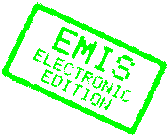On a Conjecture of R.P. Stanley; Part II-Quotients Modulo Monomial Ideals
Joachim Apel
DOI: 10.1023/A:1021916908512
Abstract
In 1982 Richard P. Stanley conjectured that any finitely generated  n -graded module M over a finitely generated
n -graded module M over a finitely generated  n -graded K-algebra R can be decomposed as a direct sum M =
n -graded K-algebra R can be decomposed as a direct sum M =  i = 1 t
i = 1 t  i S i of finitely many free modules
i S i of finitely many free modules  i S i which have to satisfy some additional conditions. Besides homogeneity conditions the most important restriction is that the S i have to be subalgebras of R of dimension at least depth M.
i S i which have to satisfy some additional conditions. Besides homogeneity conditions the most important restriction is that the S i have to be subalgebras of R of dimension at least depth M.
 n -graded module M over a finitely generated
n -graded module M over a finitely generated  n -graded K-algebra R can be decomposed as a direct sum M =
n -graded K-algebra R can be decomposed as a direct sum M =  i = 1 t
i = 1 t  i S i of finitely many free modules
i S i of finitely many free modules  i S i which have to satisfy some additional conditions. Besides homogeneity conditions the most important restriction is that the S i have to be subalgebras of R of dimension at least depth M.
i S i which have to satisfy some additional conditions. Besides homogeneity conditions the most important restriction is that the S i have to be subalgebras of R of dimension at least depth M. We will study this conjecture for modules M = R/ I, where R is a polynomial ring and I a monomial ideal. In particular, we will prove that Stanley”s Conjecture holds for the quotient modulo any generic monomial ideal, the quotient modulo any monomial ideal in at most three variables, and for any cogeneric Cohen-Macaulay ring. Finally, we will give an outlook to Stanley decompositions of arbitrary graded polynomial modules. In particular, we obtain a more general result in the 3-variate case.
Pages: 57–74
Keywords: Cohen-Macaulay module; combinatorial decomposition; monomial ideal; simplicial complex
Full Text: PDF
References
1. J. Apel, “On a conjecture of R.P. Stanley; Part I-Monomial ideals,” J. Algebraic Combin. 17 (2003), 39-56.
2. K. Baclawski and A.M. Garsia, “Combinatorial decompositions of a class of rings,” Adv. Math. 39 (1981), 155-184.
3. D. Bayer, I. Peeva, and B. Sturmfels, “Monomial resolutions,” Math. Res. Lett. 5 (1998), 31-46.
4. D. Bayer and M. Stillman, “A criterion for detecting m-regularity,” Invent. Math. 87 (1987), 1-11.
5. A. Bj\ddot orner and M.L. Wachs, “Shellable nonpure complexes and posets. I,” Trans. Amer. Math. Soc. 348(4) (1996), 1299-1327.
6. D. Eisenbud, “Commutative algebra. With a view toward algebraic geometry,” in Graduate Texts in Mathematics, Vol. 150, Springer, New York, 1995.
7. H.-G. Gr\ddot abe, “Moduln \ddot uber Streckungsringen,” Results Math. 15 (1989), 202-220.
8. S. Ho\?sten and R. Thomas, “Standard pair decompositions and integer programming,” J. Pure Appl. Algebra 139 (1999), 133-157.
9. E. Miller, B. Sturmfels, and K. Yanagawa, “Generic and cogeneric monomial ideals,” J. Symb. Comp. 29 (2000), 691-708.
10. D. Rees, “A basis theorem for polynomial modules,” Proc. Cambridge Phil. Soc. 52 (1956), 12-16.
11. G.A. Reisner, “Cohen-Macaulay quotients of polynomial rings,” Adv. Math. 21 (1976), 30-49.
12. C.H. Riquier, Les systémes d'equations aux dérivées partielles, Gauthier-Villars, Paris, 1910.
13. R.P. Stanley, “Balanced Cohen-Macaulay complexes,” Trans. Amer. Math. Soc. 249 (1979), 139-157.
14. R.P. Stanley, “Linear Diophantine equations and local cohomology,” Invent. Math. 68 (1982), 175-193.
15. J. St\ddot uckrad and W. Vogel, Buchsbaum Rings and Applications. An Interaction Between Algebra, Geometry and Topology, Springer, Berlin, 1986.
16. B. Sturmfels and N. White, “Computing combinatorial decompositions of rings,” Combinatorica 11 (1991), 275-293.
17. J.M. Thomas, “Riquier's existence theorems,” Ann. Math. 30(2) (1929), 285-310.
2. K. Baclawski and A.M. Garsia, “Combinatorial decompositions of a class of rings,” Adv. Math. 39 (1981), 155-184.
3. D. Bayer, I. Peeva, and B. Sturmfels, “Monomial resolutions,” Math. Res. Lett. 5 (1998), 31-46.
4. D. Bayer and M. Stillman, “A criterion for detecting m-regularity,” Invent. Math. 87 (1987), 1-11.
5. A. Bj\ddot orner and M.L. Wachs, “Shellable nonpure complexes and posets. I,” Trans. Amer. Math. Soc. 348(4) (1996), 1299-1327.
6. D. Eisenbud, “Commutative algebra. With a view toward algebraic geometry,” in Graduate Texts in Mathematics, Vol. 150, Springer, New York, 1995.
7. H.-G. Gr\ddot abe, “Moduln \ddot uber Streckungsringen,” Results Math. 15 (1989), 202-220.
8. S. Ho\?sten and R. Thomas, “Standard pair decompositions and integer programming,” J. Pure Appl. Algebra 139 (1999), 133-157.
9. E. Miller, B. Sturmfels, and K. Yanagawa, “Generic and cogeneric monomial ideals,” J. Symb. Comp. 29 (2000), 691-708.
10. D. Rees, “A basis theorem for polynomial modules,” Proc. Cambridge Phil. Soc. 52 (1956), 12-16.
11. G.A. Reisner, “Cohen-Macaulay quotients of polynomial rings,” Adv. Math. 21 (1976), 30-49.
12. C.H. Riquier, Les systémes d'equations aux dérivées partielles, Gauthier-Villars, Paris, 1910.
13. R.P. Stanley, “Balanced Cohen-Macaulay complexes,” Trans. Amer. Math. Soc. 249 (1979), 139-157.
14. R.P. Stanley, “Linear Diophantine equations and local cohomology,” Invent. Math. 68 (1982), 175-193.
15. J. St\ddot uckrad and W. Vogel, Buchsbaum Rings and Applications. An Interaction Between Algebra, Geometry and Topology, Springer, Berlin, 1986.
16. B. Sturmfels and N. White, “Computing combinatorial decompositions of rings,” Combinatorica 11 (1991), 275-293.
17. J.M. Thomas, “Riquier's existence theorems,” Ann. Math. 30(2) (1929), 285-310.
© 1992–2009 Journal of Algebraic Combinatorics
©
2012 FIZ Karlsruhe /
Zentralblatt MATH for the EMIS Electronic Edition
